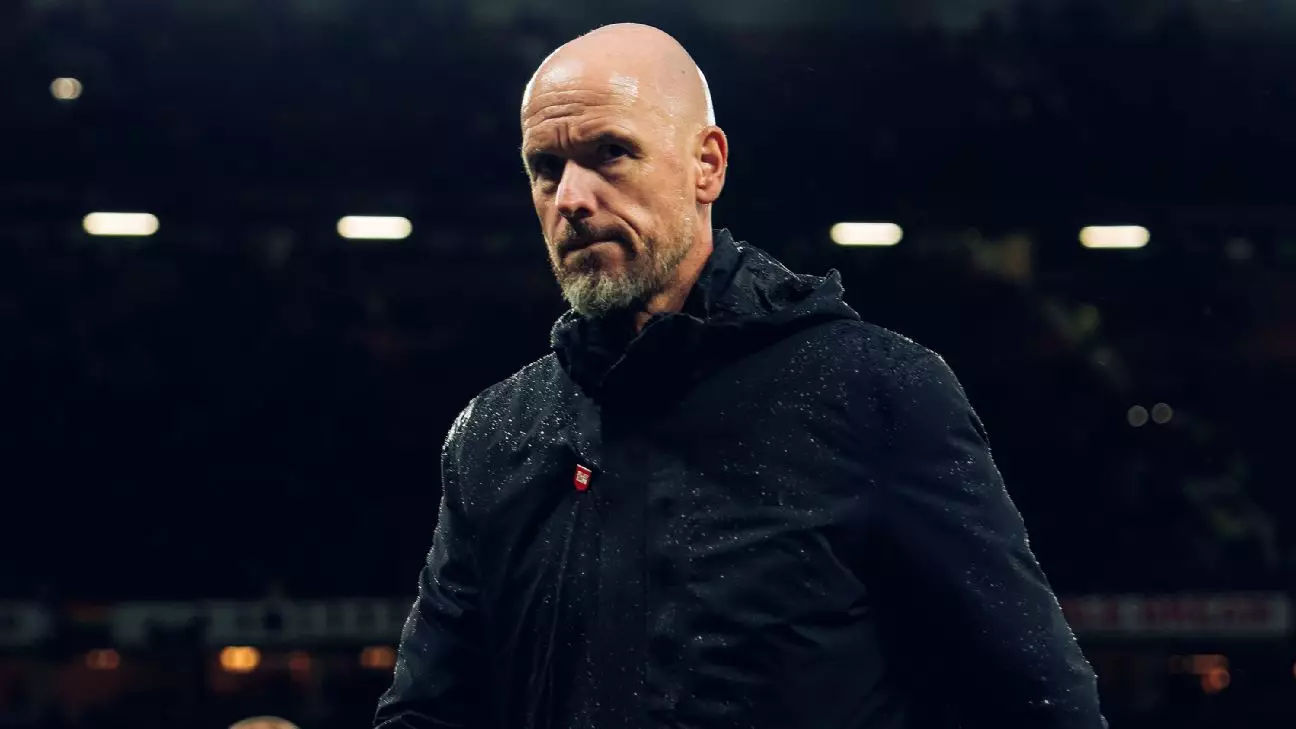Erik ten Hag finds himself at a pivotal juncture in his tenure as Manchester United’s manager. The weight of expectation looms heavily as the team continues to flounder in the Premier League. With recent results not supporting his claims of continued progress, Ten Hag is left grappling with the reality that the time for excuses has all but evaporated. While he seeks justifications for the team’s inconsistent performances, fellow managers demonstrate that immediate success can often negate the need for patience. The vast disparity between his outcomes and those of his peers only serves to amplify the scrutiny surrounding him.
A stark reflection of Ten Hag’s management came with Manchester United’s disheartening 3-0 loss to Tottenham Hotspur. This defeat marked the team’s third in six league outings, leaving them languishing in 12th place while being a full eight points adrift of the league leaders. The meager tally of five goals — one of which came in an uncharacteristically low-scoring home environment — underscores an alarming decline in attacking prowess. While Ten Hag attempted to blame a first-half red card for captain Bruno Fernandes as pivotal, this narrative ignored the overwhelming evidence of Spurs’ dominance prior to the sending-off, reflecting an unease that goes far beyond mere circumstances.
Statistics from the match were unflattering for Ten Hag. Tottenham not only led 1-0 but also commanded 60.4% possession, reflecting their superior control over the game. They were able to orchestrate 28 touches inside the United box compared to just seven from their hosts, while also matching United’s paltry three shots with 12 of their own. This clear imbalance raises questions about the preparedness and tactical acumen of Ten Hag’s team, suggesting that selective memory has become a theme in his post-match assessments.
Ten Hag has repeatedly pointed the finger at injuries for the team’s erratic performances and inconsistencies. However, this line of defense seems increasingly tenuous in light of the high-profile defeats United has suffered under his stewardship, including a dismal 7-0 shellacking at Liverpool and 4-0 losses against Crystal Palace and Brentford. These occasions, accompanied by another drubbing this season, not only tarnish his managerial resume but also reveal a deeper malaise at Old Trafford.
His significant financial outlay — over £550 million on new signings since his arrival — further complicates his position. Unlike many of his contemporaries who have faced similar constraints, Ten Hag has been equipped with resources that ostensibly should enable him to cultivate a competitive squad. The glaring reality that only Chelsea has splashed more cash raises discomforting questions about why United continue to stagnate, particularly when Chelsea themselves have seen immediate results from their new manager, Mauricio Pochettino.
The immediate future appears bleak for Ten Hag, with crucial matches on the horizon — notably a tough Europa League encounter with FC Porto followed by a Premier League clash against Aston Villa. Victory is paramount; otherwise, the expectation is that the coaching hierarchy at Old Trafford will have little choice but to reconsider their leadership direction. The fledgling football-related leadership team, including notable figures such as minority owner Jim Ratcliffe, must weigh the merits of stability against the unmistakable need for results. Their current faith in Ten Hag could quickly morph into acceptance for change if performances do not exhibit substantial improvement.
Additionally, the perspective drawn from comparing Ten Hag’s trajectory with those of successful managers like Unai Emery and Ange Postecoglou complicates his position. Both have accomplished remarkable turnarounds with their respective squads, showcasing how adept management can elicit positive results despite a challenging start. Ten Hag’s overarching narrative of struggle fails in contrast; he has yet to replicate such success, leaving fans disenchanted and restless.
Ultimately, Ten Hag’s defiance in the wake of adversity does little to mask the storm clouds gathering above Old Trafford. With a squad composed largely of his own recruits, the lack of visible cohesion and strategic clarity signals a worrying trend. If he does not succeed in instilling a sense of unity and ambition, he risks being remembered as another failed project in a long line of managers at Manchester United. The calling for accountability in football remains unwavering; without tangible improvements, Ten Hag’s days in the managerial hot seat could soon reach their twilight. With urgency mounting, supporters and management alike will be keenly observing the next chapter of this evolving saga. Time is of the essence, and for Ten Hag, it’s running perilously low.

